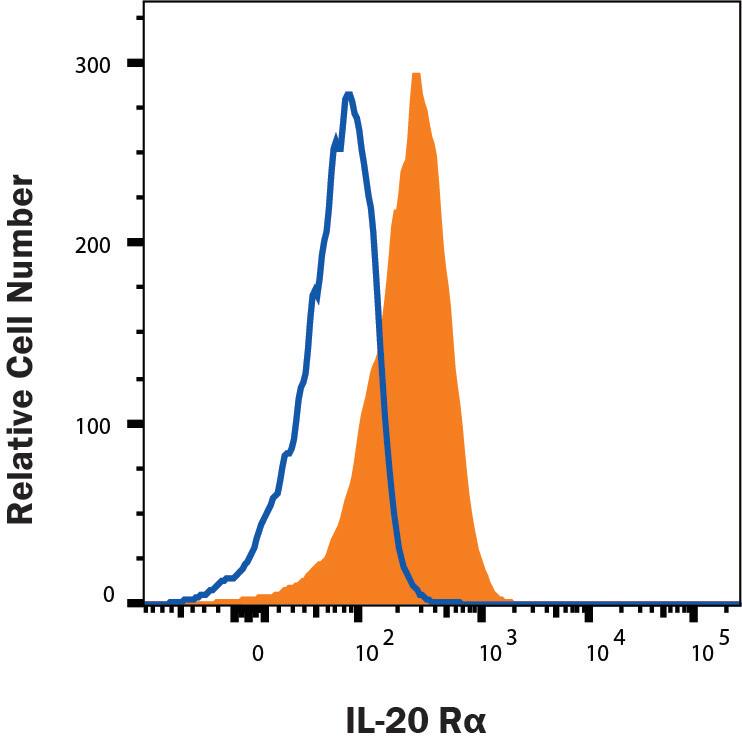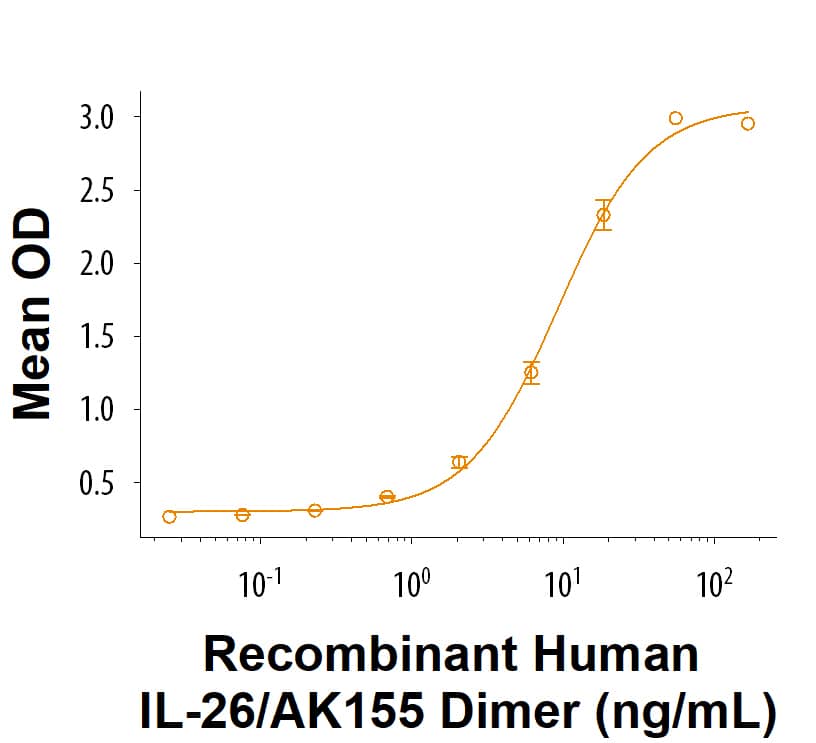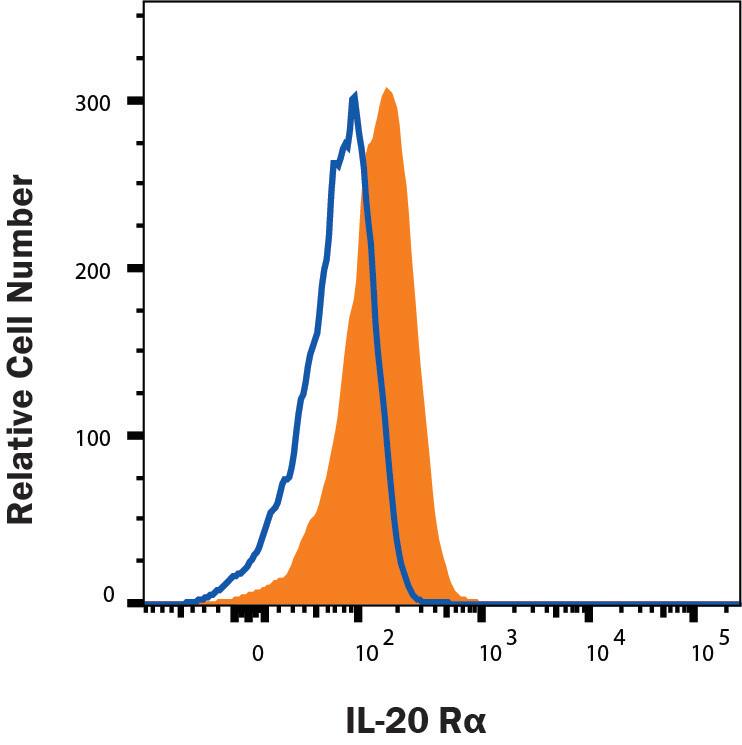IL-20R alpha Products
IL-20 receptor alpha (IL-20R alpha), also named IL-20R1, CRF2-8, and ZCYTOR7, belongs to the class II cytokine receptor family, which includes 12 members. These receptors are characterized by the patterns of conserved amino acid residues (aa) in their extracellular domains, which are composed of tandem fibronectin type III domains. Class II cytokine receptors form heterodimeric signaling receptor complexes that mediate class II cytokine signals. Subunits of the different receptor complexes are shared and serve multiple functions. The gene for human IL-20R alpha is mapped to chromosome 6 and encodes a 553 aa glycoprotein with a 29 aa signal peptide, a 221 aa extracellular domain, a 24 aa transmembrane region, and a 279 aa intracellular domain.
IL-20R alpha is widely expressed and is detected at high levels in multiple tissues including skin, testis, heart, placenta, salivary gland and prostate gland. The expression of IL-20R alpha, together with that of IL-20R beta, is upregulated in psoriatic skin lesions on keratinocytes, immune cells, and endothelial cells. IL-20R alpha heterodimerizes with IL-20R beta to form the functional receptor that mediates IL-19, IL-20, and IL-24 signals. IL-20R alpha also heterodimerizes with IL-10R beta to form the functional receptor complex for IL-26. Binding of these IL-10 family class II cytokines to their functional receptors induces activation of the JAK-STAT signal transduction pathway. At low ligand concentrations, STAT3 has been shown to be the predominant STAT proteins activated through either complexes.
Products:
179 results for "IL-20R alpha" in Products
179 results for "IL-20R alpha" in Products
IL-20R alpha Products
IL-20 receptor alpha (IL-20R alpha), also named IL-20R1, CRF2-8, and ZCYTOR7, belongs to the class II cytokine receptor family, which includes 12 members. These receptors are characterized by the patterns of conserved amino acid residues (aa) in their extracellular domains, which are composed of tandem fibronectin type III domains. Class II cytokine receptors form heterodimeric signaling receptor complexes that mediate class II cytokine signals. Subunits of the different receptor complexes are shared and serve multiple functions. The gene for human IL-20R alpha is mapped to chromosome 6 and encodes a 553 aa glycoprotein with a 29 aa signal peptide, a 221 aa extracellular domain, a 24 aa transmembrane region, and a 279 aa intracellular domain.
IL-20R alpha is widely expressed and is detected at high levels in multiple tissues including skin, testis, heart, placenta, salivary gland and prostate gland. The expression of IL-20R alpha, together with that of IL-20R beta, is upregulated in psoriatic skin lesions on keratinocytes, immune cells, and endothelial cells. IL-20R alpha heterodimerizes with IL-20R beta to form the functional receptor that mediates IL-19, IL-20, and IL-24 signals. IL-20R alpha also heterodimerizes with IL-10R beta to form the functional receptor complex for IL-26. Binding of these IL-10 family class II cytokines to their functional receptors induces activation of the JAK-STAT signal transduction pathway. At low ligand concentrations, STAT3 has been shown to be the predominant STAT proteins activated through either complexes.
Products:
| Reactivity: | Human |
| Details: | Mouse IgG1 Monoclonal Clone #173707 |
| Applications: | IHC |
| Reactivity: | Human |
| Details: | Mouse IgG1 Monoclonal Clone #173714 |
| Applications: | WB, Flow, CyTOF-ready |
| Source: | CHO |
| Accession #: | Q9UHF4.2 |
| Applications: | BA |
| Reactivity: | Human |
| Details: | Goat IgG Polyclonal |
| Applications: | WB, Flow, CyTOF-ready |
| Reactivity: | Human, Mouse |
| Details: | Rabbit IgG Polyclonal |
| Applications: | WB, Flow |
| Reactivity: | Human |
| Details: | Goat IgG Polyclonal |
| Applications: | WB, Flow |
| Reactivity: | Human |
| Details: | Mouse IgG1 Monoclonal Clone #173714 |
| Applications: | Flow |
| Reactivity: | Human |
| Details: | Mouse IgG1 Monoclonal Clone #173714 |
| Applications: | Flow |
| Reactivity: | Human |
| Details: | Mouse IgG1 Monoclonal Clone #173714 |
| Applications: | Flow |
| Reactivity: | Human |
| Details: | Mouse IgG1 Monoclonal Clone #173714 |
| Applications: | Flow |
| Reactivity: | Human |
| Details: | Mouse IgG1 Monoclonal Clone #173714 |
| Applications: | Flow |
| Source: | NS0 |
| Accession #: | Q9UHF4 |
| Applications: | Bind |
| Reactivity: | Mouse |
| Details: | Rat IgG1 Monoclonal Clone #227702 |
| Applications: | WB |
| Reactivity: | Human |
| Details: | Mouse IgG2a Monoclonal Clone #173722 |
| Applications: | WB |
| Reactivity: | Mouse |
| Details: | Sheep IgG Polyclonal |
| Applications: | WB |
| Reactivity: | Mouse |
| Details: | Sheep IgG Polyclonal |
| Applications: | WB |
| Reactivity: | Human |
| Details: | Mouse IgG1 Monoclonal Clone #173714 |
| Applications: | Flow |
| Reactivity: | Human |
| Details: | Mouse IgG1 Monoclonal Clone #173714 |
| Applications: | Flow |
| Reactivity: | Human |
| Details: | Mouse IgG1 Monoclonal Clone #173714 |
| Applications: | Flow |
| Reactivity: | Human |
| Details: | Mouse IgG1 Monoclonal Clone #MM0394-9F40 |
| Applications: | IHC, WB, ICC/IF |
Recombinant Monoclonal Antibody
| Reactivity: | Human |
| Details: | Rabbit IgG Monoclonal Clone #024 |
| Applications: | IHC, ELISA |
Recombinant Monoclonal Antibody
| Reactivity: | Human |
| Details: | Rabbit IgG Monoclonal Clone #038 |
| Applications: | IHC, ELISA |
| Reactivity: | Human |
| Details: | Rabbit IgG Polyclonal |
| Applications: | IHC |





![Western Blot: IL-20R alpha Antibody [NB100-56409] Western Blot: IL-20R alpha Antibody [NB100-56409]](https://resources.bio-techne.com/images/products/IL-20-R-alpha-Antibody-Western-Blot-NB100-56409-img0006.jpg)


![Immunohistochemistry-Paraffin: IL-20R alpha Antibody (MM0394-9F40) - Azide and BSA Free [NBP2-11695] Immunohistochemistry-Paraffin: IL-20R alpha Antibody (MM0394-9F40) - Azide and BSA Free [NBP2-11695]](https://resources.bio-techne.com/images/products/IL-20-R-alpha-Antibody-MM0394-9F40-Immunohistochemistry-Paraffin-NBP2-11695-img0001.jpg)
![Immunohistochemistry-Paraffin: IL-20R alpha Antibody (024) [NBP2-89468] Immunohistochemistry-Paraffin: IL-20R alpha Antibody (024) [NBP2-89468]](https://resources.bio-techne.com/images/products/IL-20R-alpha-Antibody-024-Immunohistochemistry-Paraffin-NBP2-89468-img0001.jpg)
![Immunohistochemistry-Paraffin: IL-20R alpha Antibody (038) [NBP2-89469] Immunohistochemistry-Paraffin: IL-20R alpha Antibody (038) [NBP2-89469]](https://resources.bio-techne.com/images/products/IL-20R-alpha-Antibody-038-Immunohistochemistry-Paraffin-NBP2-89469-img0001.jpg)
![Immunohistochemistry: IL-20R alpha Antibody [NBP1-89633] Immunohistochemistry: IL-20R alpha Antibody [NBP1-89633]](https://resources.bio-techne.com/images/products/IL-20-R-alpha-Antibody-Immunohistochemistry-NBP1-89633-img0003.jpg)